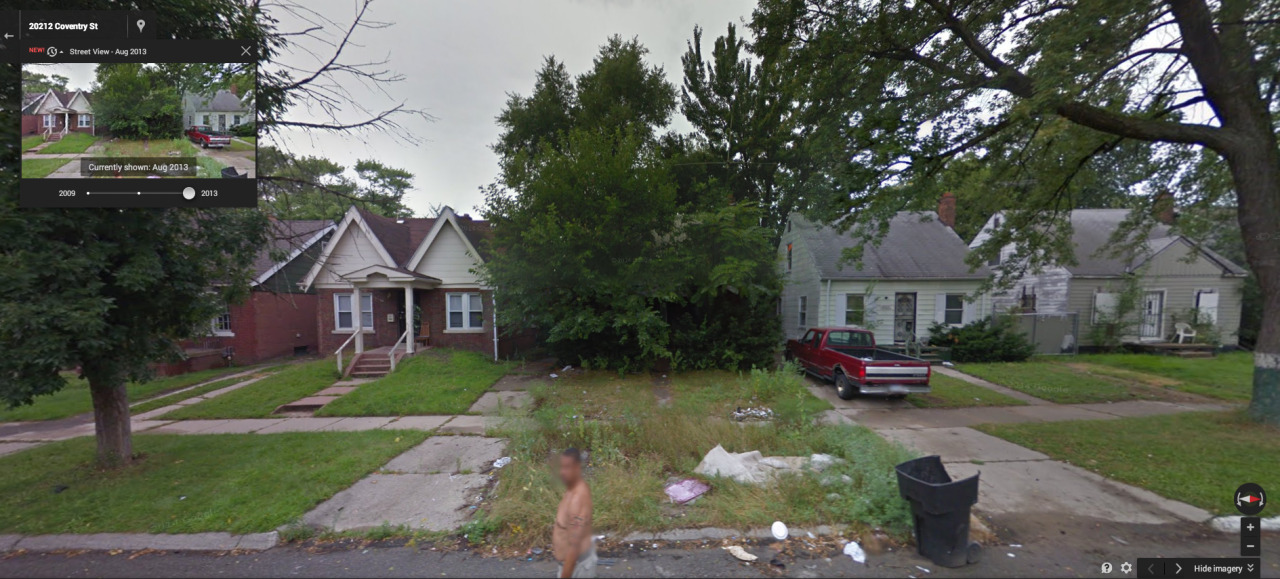Public Pensions Primer: Why Do We Pre-fund Pensions?
by meep
The main reason: Governments fail
A blogger has compiled a bunch of Google Street View images to demonstrate how some of Detroit’s neighborhoods have continued to deteriorate since the housing crisis.
Alex Alsup from Loveland Technologies published the astonishing images on his Tumblr called “goobingdetroit.” They show how drastically the bankrupt city’s streets have changed from 2008 to 2009 to 2011 to 2013.
Let’s look at a few pictures, shall we?
2009:

2011:

2013:

This tumblr is full of such progressions, including deliberate razing of abandoned homes by the city of Detroit. Many are just like the above – an untended yard taking over, a shoddily made house just decaying over a few years, abandoned homes ransacked for materials by those who are left.
Think of what this represents.
Lost property taxes as owners simply walk away and let tax liens pile up.

Lost income tax and utilities tax.
Some of the ex-residents of Detroit simply moved to the suburbs, so perhaps Detroit can soak them in the bankruptcy, but some have left Michigan entirely as jobs have also gone away.
Now, Detroit had a bunch of public workers it made pensions promises to. If these promises are not fully pre-funded by those making the promises, they have little chance of being made whole when the operation goes belly-up, as we see in Detroit. Supposedly, the Detroit pensions were in good funded status, but we shall see in this series (starting with this one), why this is misleading.
It is going to take some time to get through this primer. I wouldn’t be surprised if it takes me the rest of the year to go through it. I have some thoughts as to what to do with this stuff later, possibly spinning it off into its own website.
My plan is this: to explain very high level principles in public pension plan financing and design. Yes, there will be some numbers, but it will be mostly toy models one can play with to understand how different parts interact. These will be greatly simplified, and not to be confused with the specific situations of specific plans.
I am not a pension actuary (I am a life insurance/annuity actuary, with a huge dose of investment & risk management thrown in), so no, I do not know all the itty-bitty regs, etc. That is one reason I will be sticking to high level principles. The other reason is my intended audience are non-actuaries, and non-finance people in general.
Those reading this who are pension actuaries or who are public finance experts, I would love to hear from you if you think I got something wrong, or if there are certain topics I should cover. The best way to contact me is via email: marypat.campbell@gmail.com
We will look at a history of public pensions, some of the principles of finance in general and public finance in specific, features of public pensions, and what the dispute over such things like the discount rate are about.
So get ready, and remember that while I will be talking in some abstract and simplified terms, these things do mean real consequences here and now, such as current retirees seeing huge cuts to their pensions, when they can least recover from such a blow.
MACKINAC ISLAND, Mich. — City of Detroit retirees considering whether to approve a bankruptcy deal that eases pension cuts and spares the works at the Detroit Institute of Arts should have no illusions or false hopes about what a “no” vote could mean, the city’s emergency manager warned Friday.
“We want to make sure people understand that it doesn’t get better by voting no,” emergency manager Kevyn Orr told reporters after a speech at the Detroit Regional Chamber’s annual policy conference on Mackinac Island.
His comments came ahead of a state Senate vote expected next week on the state’s nearly $195 million contribution to the DIA-pension deal, in which the museum would be spun off from the city into a private authority for about $816 million, with the proceeds used to reduce pension reductions for city retirees.
That money disappears if retirees reject the plan, with both facing even harsher cuts. Orr said he has heard that some retirees are pledging to vote no as a protest, or to hold out in hopes of a legal challenge based on Michigan’s constitutional protection of pensions that U.S. Bankruptcy Judge Steven Rhodes has ruled is trumped by federal bankruptcy law.
It’s not all arguing over politics, over theory, over standard actuarial practice. There is reality, and it will always take its toll. The reality is that governments do fail, tax bases can get hit catastrophically, and pensions, if not fully funded, will go along with the tide.
Everyone will get hit.
Related Posts
Some Public Pensions Take (Small) Losses from FTX Disaster... But What About Other Alt Messes to Come?
Calpers Craziness: A Performance Review... and an Investigation?
Public Pension Returns Start to Roll In for FY 2022
